新概念英语第三册语法(4)虚拟语气
新概念英语的语法体系
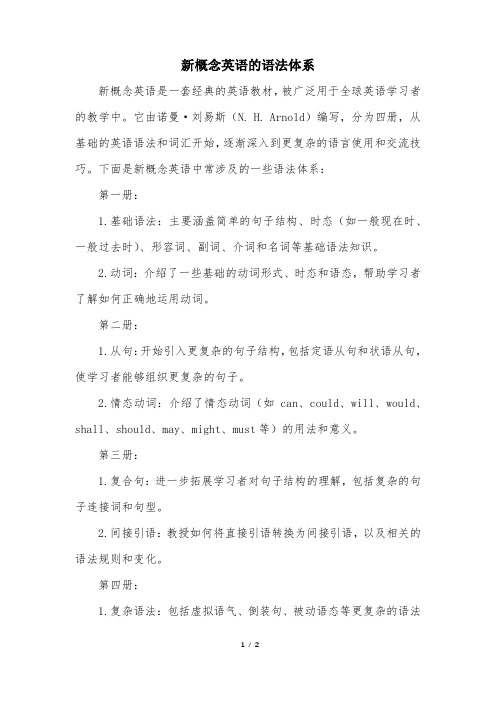
新概念英语的语法体系
新概念英语是一套经典的英语教材,被广泛用于全球英语学习者的教学中。
它由诺曼·刘易斯(N.(H.(Arnold)编写,分为四册,从基础的英语语法和词汇开始,逐渐深入到更复杂的语言使用和交流技巧。
下面是新概念英语中常涉及的一些语法体系:
第一册:
1.基础语法:主要涵盖简单的句子结构、时态 如一般现在时、一般过去时)、形容词、副词、介词和名词等基础语法知识。
2.动词:介绍了一些基础的动词形式、时态和语态,帮助学习者了解如何正确地运用动词。
第二册:
1.从句:开始引入更复杂的句子结构,包括定语从句和状语从句,使学习者能够组织更复杂的句子。
2.情态动词:介绍了情态动词 如can、could、will、would、shall、should、may、might、must等)的用法和意义。
第三册:
1.复合句:进一步拓展学习者对句子结构的理解,包括复杂的句子连接词和句型。
2.间接引语:教授如何将直接引语转换为间接引语,以及相关的语法规则和变化。
第四册:
1.复杂语法:包括虚拟语气、倒装句、被动语态等更复杂的语法
1/ 2
结构和句型。
2.词汇拓展:这一册更侧重于词汇量的扩展和更高级别的语言运用,帮助学习者提升语言表达的广度和深度。
新概念英语的特点之一是通过逐步引入语法知识,让学习者逐渐掌握并应用英语的基础结构。
每册都有一系列的练习和例句,帮助巩固所学内容,并提供了听力材料帮助学生提高听力水平。
2/ 2。
新概念英语第三册课文重点精讲解析Lesson40~42

【导语】新概念英语作为家喻户晓的经典之作,它有着全新的教学理念,有趣的课⽂内容及其全⾯的技能训练,为⼴⼤的英语学习者提供帮助!如果你也想学好英语,⼜怎能错过新概念英语?下⾯为您提供了相关内容,希望对您有所帮助!新概念英语第三册课⽂重点精讲解析Lesson40 1.It has never been explained why university students seem to enjoy practical jokes more than anyone else. 背诵句型 It为形式主语. 2.Inviting the fire brigade to put out a nonexistent fire is a crude form of deception which no self-respecting student would ever indulge in. 背诵句型 put out 扑灭,熄灭. indulge in 沉迷于 Ex:Many old people indulge in reminiscences of their youth. 3. As soon as he had hung up, he went over to the workmen and told them that if a policeman ordered them to go away, they were not to take him seriously. As soon as ⼀...就... hung up 挂上电话 go away ⾛开 take him seriously 严肃对待 be to do 结构含义: (1)should Eg: Such a private thing should be avoided. Such a private thing is to be avoided (2)must Eg: No students must leave school without the permission of the police. No students are to leave school without the permission of the police. (3)intend 意图,打算 Eg: We intend to start work next week. We are to start work next week. 4.Both the police and the workmen were grateful to the student for this piece of advance information. 背诵句型 were grateful to sb for sth 因...⽽感激/感谢 Ex:His parents were very grateful to us for informing them of his safe return. 5.When he received a very rude reply from one of the workmen, he threatened to remove them by force. 背诵句型 threatened to 恐吓要做某事 by force 以武⼒ 6.The workmen told him to do as he pleased and the policeman telephoned for help. 背诵句型 as he pleased 此句为⽅式状从,省略了 to do 7. Shortly afterwards, four more policemen arrived and remonstrated with the workmen. remonstrated with + 表⽰⼈的名词规劝... remonstrated with sb. about/ regarding/ upon/ on sth. 因...⽽规劝某⼈ Ex:His parents remonstrated with him about his bad habits. 8.At this, the police pointed out ironically that this would hardly be necessary as the men were already under arrest. 背诵句型 as this 听到 at 是介词,表⽰"⼀...(就)..." 此意思为"⼀听到这话". this 指代其中⼀个⼯⼈威胁要去叫警察这件事. Ex: At the words,he got angry. With the words, he left the room angrily. pointed out ironically 讽刺地指出 hardly be necessary ⼤可不必 under 与名词搭配表⽰⼀种被动的概念 under discussion / arrest / repair 9.Pretending to speak seriously, one of the workmen asked if he might make a telephone call before being taken to the station. 背诵句型 Pretending to 假装做... make a telephone call 打个电话 10. Permission was granted and a policeman accompanied him to a pay phone. 背诵句型 11.Only when he saw that the man was actually telephoning the police did he realize that they had all been the victims of a hoax. Only when 直到...才... Only 为副词,起强调作⽤. 只有当Only +状语这样的结构在句⾸时,句⼦(或主句) 的谓语部分才需要使⽤倒装的语序. Ex: Only if you've been through such agony will you believe it. From a scientific point of view, work is done only when the applied force produces motion.新概念英语第三册课⽂重点精讲解析Lesson41 1.City born and city bred. I have always regarded the country as something you look at through a train window, or something you occasional visit during the weekend. City born and city bred 是两个由"名词+过去分词"构成的合成词, 做形容词使⽤. 此作原因状语. regards...as 把...视为. 相当: think of ...as / refer to ...as you look at... & you occasionally visit... 为定语从句,分别修饰前⾯的 something. 在something与两个定语从句间分别省略了关系连词 that. 2.Most of my friends live in the city, yet they always go into raptures at the mere mention of the country. 背诵句型 go into raptures 变得欣喜若狂. at the mere mention of ⼀提到 at the sight of ⼀看到 at the touch of ⼀触及到 at the news of ⼀听到 at the sound of ⼀听到 Ex:They went to reptures at the good news. 3. Even he still lives under the illusion that country life is somehow superior to town life. 背诵句型 be under the illusion 有这样的错觉,其后 that引导⼀个同位语从句. Ex: He is under the illusion that he is always right. be superior to ⽐...优越. 含⽐较之意,⽤与两⼈或两个事物之间的⽐较. be superior to 还可引伸为"不为...影响"、"拒绝"等意, ⽤于此意时,介词可⽤above 替换. Ex: He's superior to bribery. be superior to 表⽰"在...⽅⾯胜过..."时,通常使⽤be superior in... to" OR "be superior to...in ..."这结构. Ex: He felt superior in maths to John. 4.He is forever talking about the friendly people... 这⾥的副词 forever 与正在进⾏时的⼀同使⽤,表⽰作者的不满这样的感情⾊彩. always, forever, constantly, continually 等副词同进⾏时态共⽤, 除表⽰某事常发⽣外, 往往表⽰说话⼈对发⽣的此类事情的不满. 5.Nothing can be compared, he maintains, with the first cockcrow, the twittering of birds at dawn, the sight of the rising sun glinting on the trees and pastures. compared with 将...同...相⽐.⽤于两者间⽐较 cockcrow n. 鸡叫 twitter v. (鸟)吱吱叫,喊喊喳喳叫 glint v. 闪烁 glinting on the trees and pastures 为现在分词短语,在句中作宾语补⾜语. he maintains 他坚持认为. 在句中作插⼊语 6.This idyllic pastoral scene is only part of the picture. 背诵句型 idyllic adj. ⽥园诗的 Ex:He is leading an idyllic life. 7. My friend fails to mention the long and friendless winter evenings in front of the TV -- virtually the only form of entertainment. fails to mention = says nothing about 没有提到...... virtually adv. ⼏乎,差不多 friendless 此处使⽤了暗喻的修辞⼿法,⽤修饰⼈的形容词来修饰事物(winter evenings). 感觉⽣动简洁. 8. Why people are prepared to tolerate a four-hour journey each day for the dubious privilege of living in the country is beyond me. They could be saved so much misery and expense if they chose to live in the city where they rightly belong. 背诵句型 dubious adj. 可疑的;怀疑的 be dubious about/of 对...怀疑,对...不肯定,主要表⽰不肯定的,不确定的 privilege n. 特权 misery n. 苦难 beyond me = be beyond my understanding 我⽆法理解的 are prepared to 愿意做. 其后为名词时, 通常构成为be prepared for... Why 为连接副词,在本句中引导⼀个主语从句. They could be... 此句使⽤了虚拟语⽓. 可翻译为"如果他们选择...他们本可省掉..." 将此句改为主动语态后为: To live in the city could save them so much misery and expense. 句中间接宾语them作主语,⽽直接宾语misery and expense 作为宾语保留在句中. 9. If you can do without the few pastoral pleasures of the country, you will find the city can provide you with the best that life can offer. 背诵句型 do without = go without 没有...也⾏ 10. There is so much variety that you never have to make do with second best. 背诵句型 never have to =need not =don't have to make do with 凑合者⽤ 11. Some of my acquaintances in the country come up to town once or twice a year to visit the theatre as a special treat. come up : up ⽤于:由乡下到城镇,由南到北 12. As the play draws to its close draw to its close = near its end 临近结束/尾声 13. The cit dweller never experiences anxieties of this sort. 背诵句型 We can keep ourselves free from the anxieties of this sort which afflict the country dweller. 14. Country people run wild when they go shopping in the city and stagger home loaded with as many of the exotic items as they can carry. 背诵句型 run wild 发疯 15. Nor is the city without its moments of beauty. nor ... without 双重否定 The city has got its own beauty.新概念英语第三册课⽂重点精讲解析Lesson42 1.Perhaps it is the desire for solitude or the chance of making an unexpected discovery that lures people down to the depths of the earth. 背诵句型 结构分析: it is the desir e ......or the chance ......that......运⽤了强调了句式,被强调的部分是句⼦的主语:it is the desire ......or the chance eg: It is the desir for knowledge that lures her into the book world. 是她对知识的渴求吸引她⾛进书的海洋。
新概念英语第3册语法之欧阳美创编
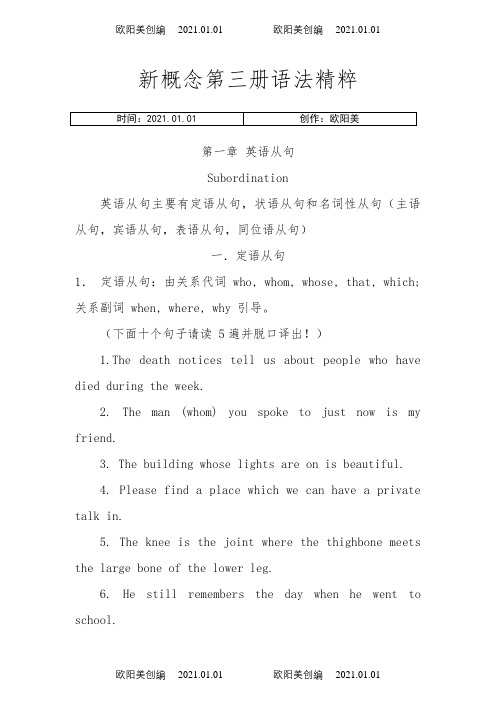
新概念第三册语法精粹第一章英语从句Subordination英语从句主要有定语从句,状语从句和名词性从句(主语从句,宾语从句,表语从句,同位语从句)一.定语从句1.定语从句:由关系代词 who, whom, whose, that, which; 关系副词 when, where, why 引导。
(下面十个句子请读 5遍并脱口译出!)1.The death notices tell us about people who have died during the week.2. The man (whom) you spoke to just now is my friend.3. The building whose lights are on is beautiful.4. Please find a place which we can have a private talk in.5. The knee is the joint where the thighbone meets the large bone of the lower leg.6. He still remembers the day when he went to school.7. It is no need telling us the reason why you didn't finish it in time.8. He has three sons, two of whom died in the war.9. Mr. Smith, whose wife is a clerk, teaches us English.10. In the Sunday paper there are comics, which children enjoy.2.只能用that和who引导的定语从句A.all, nothing, anything, a few, one做先行词指物时B.先行词前有形容词最高级修饰时,后面常跟that而不是which.C.先行词前有 the only, the first, the last, the next, the very等词修饰时,引导词只能用that。
公共英语三级语法:虚拟语气
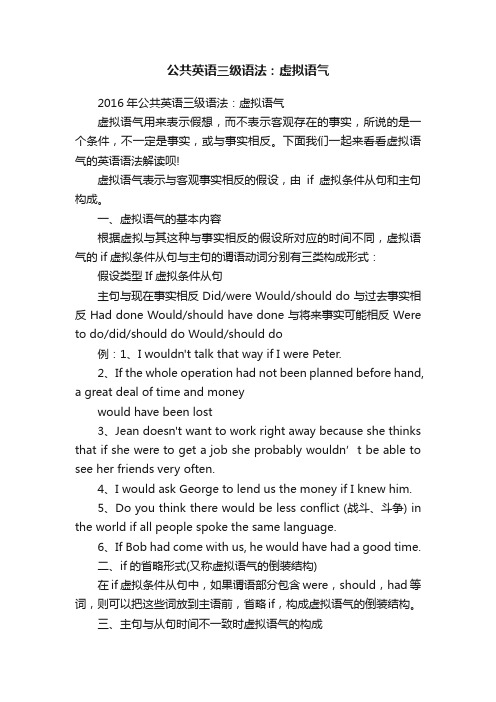
公共英语三级语法:虚拟语气2016年公共英语三级语法:虚拟语气虚拟语气用来表示假想,而不表示客观存在的事实,所说的是一个条件,不一定是事实,或与事实相反。
下面我们一起来看看虚拟语气的英语语法解读呗!虚拟语气表示与客观事实相反的假设,由if虚拟条件从句和主句构成。
一、虚拟语气的基本内容根据虚拟与其这种与事实相反的假设所对应的时间不同,虚拟语气的if虚拟条件从句与主句的谓语动词分别有三类构成形式:假设类型If虚拟条件从句主句与现在事实相反 Did/were Would/should do 与过去事实相反 Had done Would/should have done 与将来事实可能相反 Were to do/did/should do Would/should do例:1、I wouldn't talk that way if I were Peter.2、If the whole operation had not been planned before hand,a great deal of time and moneywould have been lost3、Jean doesn't want to work right away because she thinks that if she were to get a job she probably wouldn’t be able to see her friends very often.4、I would ask George to lend us the money if I knew him.5、Do you think there would be less conflict (战斗、斗争) in the world if all people spoke the same language.6、If Bob had come with us, he would have had a good time.二、if的省略形式(又称虚拟语气的倒装结构)在if虚拟条件从句中,如果谓语部分包含were,should,had等词,则可以把这些词放到主语前,省略if,构成虚拟语气的倒装结构。
新概念英语第三册虚拟语气课件

Answers for Exercise 3 on page 5 1. David is not a sculptor. If he were, he
would make a sculpture for the exhibition.
2. Sally is not an aggressive woman. If she were, she would be a more successful business woman.
If I were a bird, I could fly in the sky freely. If I were you, I would try my best to grasp the
chance.
条件句的分类
真实条件句:表示现实情况中可能实现的情 况。真实条件句中的谓语动词一般用一般现 在时代替一般将来时,用一般过去时代替过 去将来时。
3. If Sam were here, he would be so excited about meeting a famous scholar in the flesh.
4. If I could paint, I would paint you an abstract painting in the style of Matisse.
If条件句中虚拟语气的形式
假设 情况
将来
if从句谓语形式
一般过去式(be用were) should + 动词原形 were to + 动词原形
主句谓语形式
would / should / might / could +
动词原形
现在 过去
一般过去式(be 用 were)
最新整理公共英语三级常见语法:虚拟语气
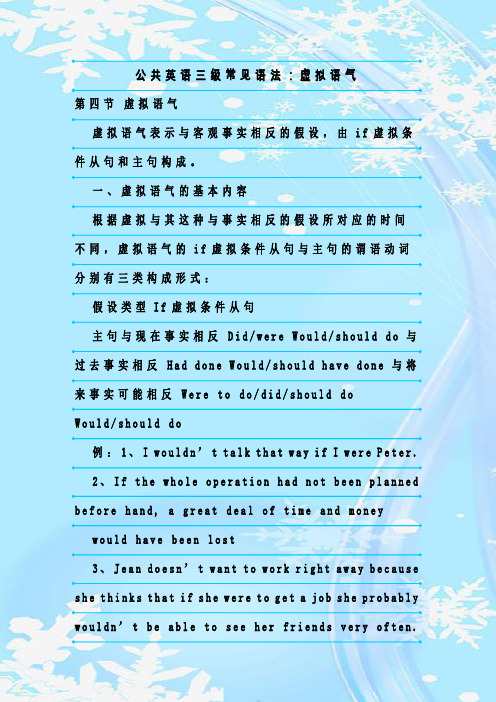
公共英语三级常见语法:虚拟语气第四节虚拟语气虚拟语气表示与客观事实相反的假设,由i f虚拟条件从句和主句构成。
一、虚拟语气的基本内容根据虚拟与其这种与事实相反的假设所对应的时间不同,虚拟语气的i f虚拟条件从句与主句的谓语动词分别有三类构成形式:假设类型I f虚拟条件从句主句与现在事实相反 D i d/w e r e W o u l d/s h o u l d d o与过去事实相反 H a d d o n e W o u l d/s h o u l d h a v e d o n e与将来事实可能相反 W e r e t o d o/d i d/s h o u l d d oW o u l d/s h o u l d d o例:1、I w o u l d n’t t a l k t h a t w a y i f I w e r e P e t e r.2、I f t h e w h o l e o p e r a t i o n h a d n o t b e e n p l a n n e db e f o r e h a n d,a g r e a t d e a l o f t i m e a n d m o n e yw o u l d h a v e b e e n l o s t3、J e a n d o e s n’t w a n t t o w o r k r i g h t a w a y b e c a u s e s h e t h i n k s t h a t i f s h e w e r e t o g e t a j o b s h e p r o b a b l y w o u l d n’t b e a b l e t o s e e h e r f r i e n d s v e r y o f t e n.4、I w o u l d a s k G e o r g e t o l e n d u s t h e m o n e y i f I k n e w h i m.5、D o y o u t h i n k t h e r e w o u l d b e l e s s c o n f l i c t (战斗、斗争) i n t h e w o r l d i f a l l p e o p l e s p o k e t h e s a m e l a n g u a g e.6、I f B o b h a d c o m e w i t h u s, h e w o u l d h a v e h a d ag o o d t i m e.二、i f的省略形式(又称虚拟语气的倒装结构)在i f虚拟条件从句中,如果谓语部分包含w e r e,s h o u l d,h a d等词,则可以把这些词放到主语前,省略i f,构成虚拟语气的倒装结构。
虚拟语气的三种形式
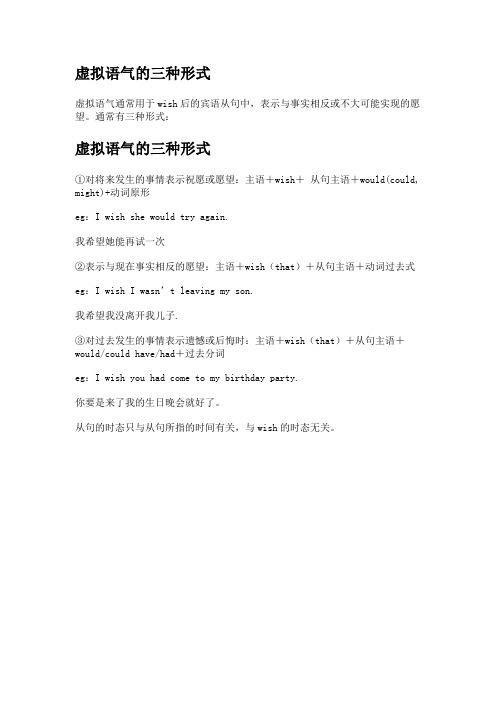
虚拟语气的三种形式
虚拟语气通常用于wish后的宾语从句中,表示与事实相反或不大可能实现的愿望。
通常有三种形式:
虚拟语气的三种形式
①对将来发生的事情表示祝愿或愿望:主语+wish+从句主语+would(could, might)+动词原形
eg:I wish she would try again.
我希望她能再试一次
②表示与现在事实相反的愿望:主语+wish(that)+从句主语+动词过去式eg:I wish I wasn’t leaving my son.
我希望我没离开我儿子.
③对过去发生的事情表示遗憾或后悔时:主语+wish(that)+从句主语+would/could have/had+过去分词
eg:I wish you had come to my birthday party.
你要是来了我的生日晚会就好了。
从句的时态只与从句所指的时间有关,与wish的时态无关。
新概念第三册核心语法整理

单元二:倒装句(1)否定词在前的情况完全倒装:谓语部分倒装:助动词(系动词+情态动词)1.no sooner had he arrived than they asked him to l eave again.2.Hardly had he begun to speak when the audience interrupted him.3.Not until he comes back will I go to sl eep(not until 主句部分倒装,从句不倒装)4.Not until 1895 did Cornell University begin to offer a d egree in ornithol ogy.5.Not until linol eum was invented in 1860 did any house have hard-wearing,easy-to-cl ean fl ooring.6.At no time shoul d we divorce ourselves from the masses of the peopl e.(部分倒装)7.Not a singl e paper did he write l ast term.8.Nor for a moment can the man imagine that he woul d die abroad.倒装句(2)让步状语从句形容词/副词/名词+ as/ though +主语+谓语1.much as we may pride ourselves on our god taste, we are no l onger free tochoose the things we want.(副词)2.old as I am, I can still fight.(形容词)3.chil d though he is , he can do some cooking.(名词)动词(原型)+as/though+主语+助动词/情态动词1.try as I might, I coul d not lift the stone.2.Try hard as he will, he never seems abl e to do the word satisfactorily.特殊:as引导的原因状语从句也可以用倒装:tired as she was , I decided not to disturb her.长句:3.great succes s though you have achieved, you must not be conceited.4.Run dry as the see were to and crumble as the rocks were to , I woul d notbreak my promise.5.Only for one year as she has been here, she become quite an expert in thisfiel d.倒装句(3)方位副词前置there, here ,now ,then和up, d own, in , out等副词在句首,要完全倒装1.there appeared on the horizon a man on horseback, riding in my direction.Now comes your luck. Out rushed the littl e boy.主语是代词的时候不用倒装2.here he comes.3.Out he rushed.倒装句(4)补充地点介词短语:1.behind him hang the map.2.In this box is found the book.分词短语:1.lying on the fl oo r was a boy aged about fifteen.2.Discussed in the conference was a proposal to reform income taxes.表语(形容词,过去分词,介词短语):1.invicible are the forces of the pl2.gone are the days when were student s.3.Among the goods are appl es, oranges, bananas····同位语从句why:my original question why he do it has not been answered.Whether: he was again tortured by the doubt whether he coul d meet Mary at the station.单元三:独立主格结构:表示时间,原因,条件,方式和伴随情况自己主语+无动词分句现在分词:weather permitting, I will start tomorrow.过去分词:his homework done , Jim decided to go and see the pl ay.无动词独立结构:the meal over ,we began to work again.不定式独立结构:the detail s to be worked out l ater, the pl an was approved. With 引导的独立主格结构定语:the woman with a baby on her back is my sister原因状语:with his homework finished , he felt very happy.伴随状语:with his face covered tears, he ran into the room. With tears streaming down her cheeks, she sat there .1.sand is formed by the weathering and d ecomposition of all types of rock, it smost abundant mineral constitution being quart s.2.The job finished ,we went home st raight away.3.Two hundred peopl e died in the accident, many of them chil dren.4.There being nothing el se to do ,we l eft.5.I woul d not dare to go home without the job finished.过去分词作宾语补足语(-ed)See,hear,feel ,find ,think·······1.I saw the student s assembled in the hall.2.They found a beautifully-cooked wall et and notes turned to ash.单元四:原因状语从句:because , sine , as , now that, fornow that= seeing that =in that=considering thatthis machine differs from the other one in that it is more powerful.双重否定never fail to: cat s never fail t o fascinate human beingsnot without: he doesn’t have any meal without meat sno not: there is nothing that he can’t d o.单元五:so that 别忘了还有表示结果的意思:we all arrived at 8:00 so that the meeting began promptly.So···that···倒装:主句部分倒装,that从句不倒装1.So great is our passion for doing things for ourselves , that we are becomingincreasingly l ess dependent on specialized l abour.2.So quickly did the workmen finish their work that they were given a bonus.3.So inferior was the quality of the radio that I took it back and asked for abetter one.4.To such a degree was he hurt that he woul d never forgive you.Such+ a +形容词+ 单数名词=so+形容词+a+单数名词1.He was in such a bedraggl ed condition that an assistant refused to serve him.2.He was in so bedraggl ed a condition that····3.It was so hot a day that we went swimming.4.It is such nice weather that I woul d like to o the beach.(weather为不可数名词,只能用such)特殊:当强调的名词前有many, few, litter时,还是用so1.he took so many cases with him that he had to call a taxi2.he earned so littl e money that he coul d barely support his family.让步状语从句:though although (不能用but,但可以用yet强调转折)though she is not pretty, yet she is very l ovely.单元六:现在分词作状语同时发生:flying over the channel , the pil ot saw a meteorite.动作发生在主句之前:having noted d own our names ,the policeman dismissed us.条件状语:you will only make yourself more tired, keeping on your feet.结果:he applied more water to the fl ower, only making things worse.(结果置于句末,多和only 连用)单元七:woul d rather ···than····接动词原型:pl woul d rather pay l arge sums of money than have their life work destroyed by gangsters.It is time / Woul d rather +从句:虚拟语气,宁愿让某人干某事。
- 1、下载文档前请自行甄别文档内容的完整性,平台不提供额外的编辑、内容补充、找答案等附加服务。
- 2、"仅部分预览"的文档,不可在线预览部分如存在完整性等问题,可反馈申请退款(可完整预览的文档不适用该条件!)。
- 3、如文档侵犯您的权益,请联系客服反馈,我们会尽快为您处理(人工客服工作时间:9:00-18:30)。
新概念英语第三册语法精粹(四):虚拟语气
虚拟语气用来表达不可能或难以实现的愿望,与事实相反的假设,通常分为基本的三种形式。
1. 与现在事实相反的虚拟:
If + did / were + ..., ... would
should
could + do (动词原形)
might
If I were you, I would go abroad at once. (I am not you.)
If he knew it now, he could help me. (He doesn't know it now.)
2. 与过去事实相反的虚拟:
If + had done + ..., ... would (might) have done ...
If I had known your telephone number yesterday, I would have phoned you.
(I didn't know your telephone number.)
If you had come here a littleearlier just now, you might have met her.
(You didn't come here earlier.)
3. 与将来事实相反的虚拟:
(1) If + should + v., ... would + v.
(可能性很小)(译作“万一”)
If it should rain tomorrow, you could stay at home.
If I should fail, what should Ido?
(2) If + did / were to + v ..., would + v.
(完全不可能)
If the sun were to rise in the west, I would lend you the money.
If you finished it in 3 minutes, I would give you my car.
4. 金牌特殊重点:!!
[简单联想记忆]:
● 下列动词后的“宾语从句”中需要用虚拟形式,即should + 动词原形,shoud在美国英语中要省略(TOEFL语法考点)。
此类常见的动词有:order, ask, decide, demand, require, recommend, suggest(建议)insist(坚决要求),advise, etc.
例句:He suggested that we (should) help them with English.
The teacher ordered that the homework (should) be finished within half an hour.
● 下列名词后的同位语从句中要用“should + 动词原形”(should可省去)的虚拟。
suggestion, order, request, demand, importance, proposal.
He made a suggestion that we (should) have a fancy dress party.
I think it is a thing of importance that it (should) be done soon.
● It is / was important / necessary / natural / essential / advisable / strange / surprising, ect. + that +主语+ should + v.
It is strange that you should say such a thing.
It was important that you should tell me all the information.
● wish后的宾语从句中,as if 后的状语从句中,须用下列的虚拟形式:
主 + wish+ (that) + 主 + did / were(指现在)
haddone(指过去)
would+ v.(指将来)
Iwishthat I met my uncle now.
IwishI had met my uncle yesterday.
IwishI could meet my uncle tomorrow.
● It is (high) time that ... + did / were ... It is time that you went to bed.
● would rather that ... + did / were ...
I would rather that you were not here now.
● would sooner that ... + did / were ...
I would sooner that you got up earlier.
I would sooner that you were not my brother.。
